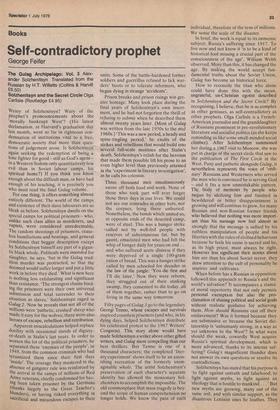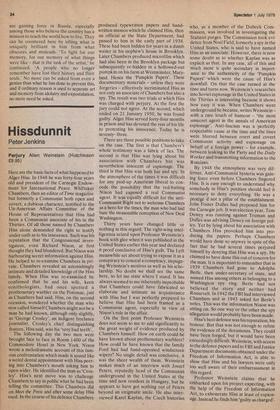Self-contradictory prophet
George Feifer
The Gulag Archipelago: Vol. 3 Alexander Solzhenitsyn Translated from the Russian by H.T. WI!lefts (Collins & Harvill E6.50) Solzhenitsyn and the Secret Circle Olga Carlisle (Routledge £4.95) Weary of Solzhenitsyn? Wary of the prophet's pronouncements about the 'morally bankrupt West'? (His latest declamation, at Harvard's graduation day last month, went so far in righteous condemnation of institutions vital to a free, democratic society that more than questions of judgement arose. Is Solzhenitsyn again seeking the redemption of being a lone fighter for good still as God's agent — in a Western Sodom only quantitatively less evil than in Soviet labour camps, his Spiritual home?) If you think you know enough about the difficult man, or have had enough of his teaching, it is precisely you who must read the final Gulag volume. For one thing, it offers something almost entirely different. The world of the camps and existence of their slave labourers are as bleak as before. Solzhenitsyn dwells on the Special camps for political prisoners — who, unlike such class allies as murderers, and rapists, were considered unredeemable. The random shootings of prisoners, ceaseless humiliations and beatings, and general conditions that beggar description extent by Solzhenitsyn himself are part of a gigantic black whole. Politicals were intended for Slaughter, he says, tut in the Gulag tradition murder was protracted, so that the doomed would suffer longer and put a little work in before they died.' What is new here is nothing less exhilarating and significant than resistance. 'The strongest chains binding the prisoners were their own universal submission and total surrender to their situation as slaves,' Solzhenitsyn raged in Gulag 2. Now he reveals that not all of the millions were 'pathetic, crushed' sheep who made it easy for the wolves; there were also heroes of escape, rebellion and retribution.
Apparent miscalculations helped replace docility with occasional stands of dignityor-death in Stalin's last years. In order to worsen the lot of the political prisoners, he separated these 'enemies of the people', in 1948, from the common criminals who had tyrannized them since their first days inside'. The courage they mustered in the absence of gangster rule was reinforced by the arrival in the camps of millions of Red Army veterans, chiefly condemned for having been taken prisoner by the Germans (thanks largely to the Great Teacher's blunders), or having risked everything in sacrificial and miraculous escapes to their units. Some of the battle-hardened former soldiers and guerrillas refused to lick warders' boots or to tolerate informers, who began dying in strange 'accidents'.
Prison breaks and prison risings win greater homage. Many took place during the final years of Solzhenitsyn's own interrment, and he had not forgotten the thrill of refusing to submit when he described them almost twenty years later. (Most of Gulag was written from the late 1950s to the mid 1960s.) 'This was a new period, a heady and spine-tingling period,' he exults of the strikes and rebellions that would build into several full-scale mutinies after Stalin's death. Solzhenitsyn's relish for the heroism that made them possible lift his prose to an even higher level than previously attained in the 'experiment in literary investigation', as he calls his colossus.
Three thousand men simultaneously swore off both food and work. None of those who took part will ever forget those three days in our lives. We could not see our comrades in other huts, nor the corpses, lying there unburied. Nonetheless, the bonds which united us, at opposite ends of the deserted camp, were of steel. This was a hunger strike -called not by well-fed people with reserves of subcutaneous fat, but by gaunt, emaciated men who had felt the whip of hunger daily for years on end . . and who suffered acute distress if they were deprived of a single 100-gram ration of bread. This was a hunger strike called by men schooled for decades in the law of the jungle: 'You die first and I'll die later.' Now they were reborn, they struggled out of their stinking swamp, they consented to die today, all of them together, rather than to go on living in the same way tomorrow.
Fifty pages of Gulag 3 go to the legendary Georgi Tenno, whose escapes and survivals inspired countless prisoners (and who, in his dying days, helped Solzhenitsyn distribute his celebrated protest to the 1967 Writers' Congress). This story alone would have made Solzhenitsyn a writer above other gifted writers, and Gulag more compelling than our best thrillers. But Tenno is one of a thousand characters; the completed 'literary experiment' shows itself to be an astonishing recreation of the formerly unimaginable whole. The artist Solzhenitsyn's preservation of each character's separate identity has allowed the missionary Solzhenitsyn to accomplish the impossible. The old commonplace that mass tragedy is beyond the scope of human comprehension no longer holds. We know the pain of each
individual, therefore of the tens of millions. We sense the scale of the disaster.
In brief, the work is equal to its immense subject: Russia's suffering since 1917. To live now and not know it 'is to be a kind of historical fool missing a crucial part of the consciousness of the age', William Webb observed. More than this, it has changed the age. By making the world accept fundamental truths about the Soviet Union, Gulag has become an historical force.
How to reconcile the titan who alone could have done this with the mean, ungrateful, un-Christian egotist described in Solzhenitsyn and the Secret Circle? By recognising, I believe, that he is as complex as other geniuses, as self-contradictory as other prophets. Olga Carlisle is a FrenchAmerican journalist and the granddaughter of Russians prominent in pre-revolutionary literature and socialist politics (as she keeps reminding us like some small-minded social climber). After Solzhenitsyn summoned her during a 1967 visit to Moscow, she was put in charge of the secret circle that saw to the publication of The First Circle in the West. Puny and pathetic alongside Gulag, it nevertheless represents the voice of 'ordinary' Russians and Westerners who served the man who is convinced he is serving God — and it fits a now unmistakable pattern. The body of memoirs by people who began by idolizing him and finished in bewildered or bitter disappointment is growing and will continue to grow, for many Russian and non-Russian former friends who believed that nothing was more important than his message now feel almost as strongly that the message is sullied by his ruthless manipulation of people and his liberties with the rules of civilised behaviour because he feels his cause is sacred and he, as its high priest, must always be right. However less significant their stories about him are than his about Soviet terror, they draw attention to the cult of personality he inspires and cultivates.
When before has a Russian in opposition followed this approach to Russia's and the world's salvation? It accompanies a stance of moral superiority that not only permits personal exemption but also the proclamation of shining political and social goals without realistic guidance for achieving them. How should Russians cast off their enslavement? Was it formed because they are submissive or because the Soviet dictatorship is `unhumanly strong, in a way as yet unknown to the West'? In what ways should the weak, cowardly West acquire Russia's spiritual development, which is more advanced, thanks to its intense suffering? Gulag's magnificent thunder does not answer its own questions or resolve its contradictions.
Solzhenitsyn has stated that his purpose is 'to fight against untruth and falsehood, to fight against myths, to fight against an ideology that is hostile to mankind. . . ' But new myths are growing, many out of the same soil, and with similar support, as the disastrous Leninist ones he loathes. They
are gaining force in Russia, especially among those who believe the country has a mission to teach the world how to live. They can be countered here by sifting what is uniquely brilliant in him from what obscures and misleads. 'To fight for our memory, for our memory of what things were like — that is the task of the artist,' he continued. 'A people who no longer remember have lost their history and their souls.' No more can be asked from even a genius than what he has done to prevent this, and if ordinary reason is used to separate art and memory from idolatry and expostulation, no more need be asked.







































 Previous page
Previous page